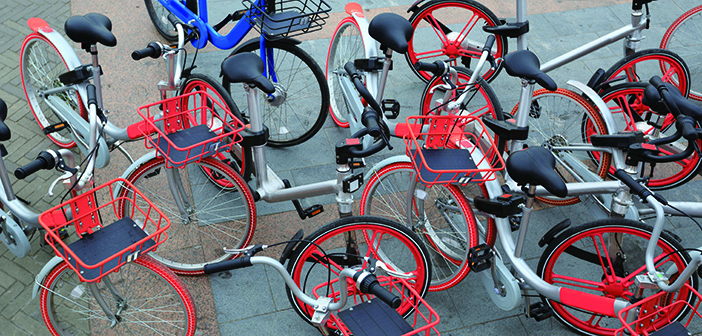Beijing is an amazing place if you love biking. There are countless nooks and crannies in this wonderful, ancient city to explore, and the best way to discover them is by bike. Along with being a great form of exercise, biking liberates you from the choice of public transport or horrendous traffic and gets you where you need to be. With this in mind, we enlisted a group of British School of Beijing (BSB), Shunyi students to tell us exactly how their relationship with biking, for sport and leisure, has developed, along with how to make the most of this city by solely using your own generated power and thirst for adventure.
Disclaimer: While biking in Beijing is generally safe, it is important to ride with a helmet and with caution to avoid injury. Bike safe, and smart!
When I used a Mobike for the first time, I realized just how easy it was to access shared bikes right on the street and set out on an adventure. If you are living here in Beijing, they can be quite hard to miss!
Dockless bikes, as their name indicates, don’t require a docking station. The main feature that distinguishes dockless systems from traditional bike-sharing is that riders can pick the bike up and drop it off anywhere on the street. In 2015, bike-sharing took off in China with the launch of bike-sharing companies such as Ofo and Mobike. Now, roughly 2.4 million shared bicycles can be found across Beijing. These bikes with their striking yellows, oranges, and blues add vibrant colors to the streets of our concrete jungle, but also a number of complications.
Although bike-sharing is sustainable transportation which can play a part in reducing air pollution, it has caused a fair share of problems throughout China, with safety concerns having risen sharply in recent years. There have been some issues with bike surpluses, as bike-sharing companies battle for supremacy. This has since resulted in huge piles of abandoned bikes creating “bike graveyards.” What’s more, those massive piles of orange and yellow bikes have been known to trip pedestrians.
How to use a dockless bike?
1. Download an app. There are a few bike-sharing apps to choose from. The most popular bike-sharing apps in China are Mobike, Ofo, Bluegogo, and U-bicycle. When you find the right one, download the app that matches the bike you want to use. It’s best to choose the one that you see most often around your neighborhood, or around town.
2. Create an account. If you are a foreigner living in China, the following bits of info are needed.
• A smartphone with Chinese SIM and internet.
• A valid ID (e.g Passport).
• WeChat or Alipay payment activated on a smartphone.
After downloading and opening the app you will be asked to enter your phone number, and then you will be sent a pin number to submit. Following this step, you will need to verify your identity. For Mobike, there is an option if you don’t have a Chinese ID card at the bottom. Click here. After this, you will need to submit your full name, your passport number along with two photos; one of you holding your passport and another of just your passport. Once you do this you are almost ready to ride. Now, you just need to add money from your Alipay or WeChat wallet to your app and you will be ready to ride.
3. Open the app. It will conveniently show you all the bikes in your area. Try to find the bike in the best condition. Make sure to check tire pressure, the brakes, and other parts to make sure it is functioning. Sometimes a bike will not unlock for use if it needs maintenance, but this isn’t always the case.
4. Tap and scan. When you find the bike you want, tap the “unlock” button and scan the QR code to unlock the bike automatically. If the bike you chose was rendered unusable by a previous user, then the bike might not unlock. If the bike does indeed unlock then you can then begin your journey.
5. Park and lock. When you complete your ride, park your bike safely and simply click the lock back into place. Once done, the app will automatically charge you the amount of your ride from your current balance. Usually, it costs between RMB 0.5 and RMB 1 depending on distance and time.
Photo: Adobe Creative Cloud
A complete version of this article appears on p49-52 of the beijingkids September 2018 Teen Takeover issue.





